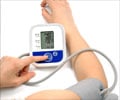A bad night's sleep may result in a spike in blood pressure that night and the following day.

The link between poor sleep and cardiovascular health problems is increasingly well-established in scientific literature, but the reason for the relationship is less understood.
Researchers set out to learn more about the connection in a study of 300 men and women, ages 21 to 70, with no history of heart problems. Participants wore portable blood pressure cuffs for two consecutive days. The cuffs randomly took participants' blood pressure during 45-minute intervals throughout each day and also overnight.
At night, participants wore actigraphy monitors - wristwatch-like devices that measure movement - to help determine their "sleep efficiency," or the amount of time in bed spent sleeping soundly. Overall, those who had lower sleep efficiency showed an increase in blood pressure during that restless night. They also had higher systolic blood pressure - the top number in a patient's blood pressure reading - the next day.
More research is needed to understand why poor sleep raises blood pressure and what it could mean long-term for people with chronic sleep issues. Yet, these latest findings may be an important piece of the puzzle when it comes to understanding the pathway through which sleep impacts overall cardiovascular health.
"Blood pressure is one of the best predictors of cardiovascular health," said lead study author Caroline Doyle, a graduate student in the UA Department of Psychology. "There is a lot of literature out there that shows sleep has some kind of impact on mortality and on cardiovascular disease, which is the No. 1 killer of people in the country. We wanted to see if we could try to get a piece of that story - how sleep might be impacting disease through blood pressure."
Advertisement
"Keep the phone in a different room," he suggested. "If your bedroom window faces the east, pull the shades. For anything that's going to cause you to waken, think ahead about what you can do to mitigate those effects."
Advertisement
Doyle and Ruiz say they hope their findings - showing the impact even one fitful night's rest can have on the body - will help illuminate just how critical sleep is for heart health. "This study stands on the shoulders of a broad literature looking at sleep and cardiovascular health," Doyle said. "This is one more study that shows something is going on with sleep and our heart health. Sleep is important, so whatever you can do to improve your sleep, it's worth prioritizing."
Source-Eurekalert















